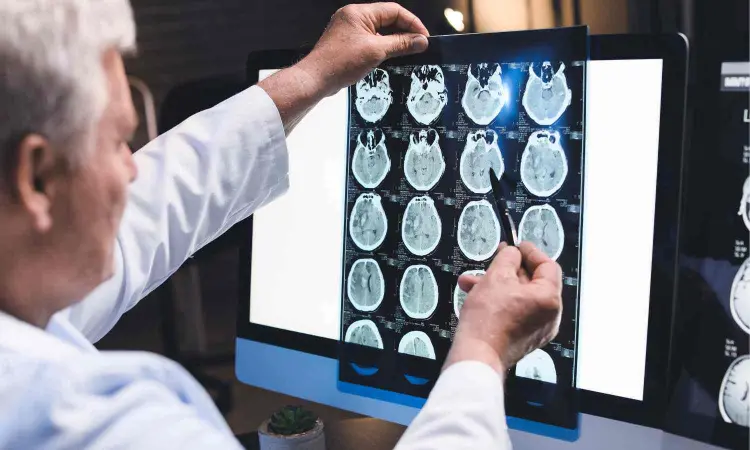- Home
- Medical news & Guidelines
- Anesthesiology
- Cardiology and CTVS
- Critical Care
- Dentistry
- Dermatology
- Diabetes and Endocrinology
- ENT
- Gastroenterology
- Medicine
- Nephrology
- Neurology
- Obstretics-Gynaecology
- Oncology
- Ophthalmology
- Orthopaedics
- Pediatrics-Neonatology
- Psychiatry
- Pulmonology
- Radiology
- Surgery
- Urology
- Laboratory Medicine
- Diet
- Nursing
- Paramedical
- Physiotherapy
- Health news
- Fact Check
- Bone Health Fact Check
- Brain Health Fact Check
- Cancer Related Fact Check
- Child Care Fact Check
- Dental and oral health fact check
- Diabetes and metabolic health fact check
- Diet and Nutrition Fact Check
- Eye and ENT Care Fact Check
- Fitness fact check
- Gut health fact check
- Heart health fact check
- Kidney health fact check
- Medical education fact check
- Men's health fact check
- Respiratory fact check
- Skin and hair care fact check
- Vaccine and Immunization fact check
- Women's health fact check
- AYUSH
- State News
- Andaman and Nicobar Islands
- Andhra Pradesh
- Arunachal Pradesh
- Assam
- Bihar
- Chandigarh
- Chattisgarh
- Dadra and Nagar Haveli
- Daman and Diu
- Delhi
- Goa
- Gujarat
- Haryana
- Himachal Pradesh
- Jammu & Kashmir
- Jharkhand
- Karnataka
- Kerala
- Ladakh
- Lakshadweep
- Madhya Pradesh
- Maharashtra
- Manipur
- Meghalaya
- Mizoram
- Nagaland
- Odisha
- Puducherry
- Punjab
- Rajasthan
- Sikkim
- Tamil Nadu
- Telangana
- Tripura
- Uttar Pradesh
- Uttrakhand
- West Bengal
- Medical Education
- Industry
Over-the-counter pain relievers linked to improved recovery from concussion, finds study

People who take over-the-counter pain relievers after a concussion may recover faster than those who do not take pain relievers, according to a preliminary study released today, March 5, 2025, that will be presented at the American Academy of Neurology’s 77th Annual Meeting taking place April 5–9, 2025, in San Diego and online.
The study does not prove that pain relievers improve recovery after concussion; it only shows an association.
“These results are exciting as there are limited treatment options for concussion, and over-the-counter pain relievers are readily available and inexpensive,” said study author Kyle Arnold, MD, of the University of Washington in Seattle and a member of the American Academy of Neurology. “If these results can be confirmed by a controlled study, they could guide us to possible treatment options for people after a concussion.”
The cohort study was conducted by the NCAA and US Department of Defense CARE Consortium and looked at NCAA athletes and military cadets who had concussions. A total of 813 people took over-the-counter pain relievers such as acetaminophen or ibuprofen and other non-steroidal anti-inflammatory drugs after their concussion and 848 people did not take any pain relievers.
Researchers looked at the amount of time it took the athletes to be cleared to return to activities with no restrictions at both 50% recovery and 90% recovery, meaning when 50% of the athletes in the study recovered and then later when 90% recovered.
People who took the pain relievers were 20% more likely to have a faster time before they were cleared to return to activities with no restrictions than those who did not take pain relievers. Those who took the medications were cleared at 50% recovery an average of two days faster, and at 90% recovery an average of seven days faster than those who took no medication.
People who took pain relievers were also about 15% more likely to return to having no symptoms more quickly than those who did not take pain relievers. At 50% recovery, those taking the medications had no symptoms one day sooner than those not taking the medications. At 90% recovery, they had no symptoms three days sooner.
Those who took pain relievers also had lower scores on tests of how severe their symptoms were overall and how severe their headaches were.
The researchers also found that the earlier people took the pain relievers after the injury, the faster they recovered. For instance, at 50% recovery, those who started using pain relievers on the first day of their injury returned to play and had resolution of symptoms approximately eight days faster than those who started taking them after five or more days.
There was no difference between the type of pain reliever taken and how quickly people recovered.
“Early medication use appeared to be linked to shorter recovery times, but these findings require further validation through controlled trials,” Arnold said. “In the meantime, these preliminary results may help inform potential treatment options for people recovering from concussions, but additional studies are needed to provide more definitive recommendations.”
Dr Kamal Kant Kohli-MBBS, DTCD- a chest specialist with more than 30 years of practice and a flair for writing clinical articles, Dr Kamal Kant Kohli joined Medical Dialogues as a Chief Editor of Medical News. Besides writing articles, as an editor, he proofreads and verifies all the medical content published on Medical Dialogues including those coming from journals, studies,medical conferences,guidelines etc. Email: drkohli@medicaldialogues.in. Contact no. 011-43720751


